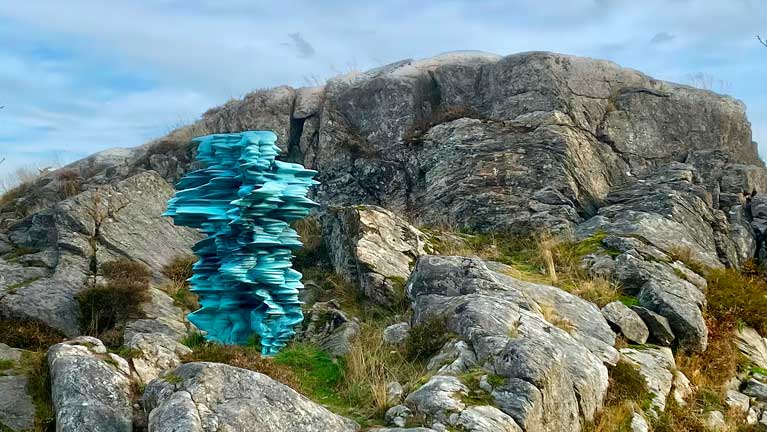

Tony Cragg Pool
Pool by Tony Cragg interacts with nature in a marvellous way. Its billowing volume harmonises with the surrounding cliff walls. Organic natural contours and geometric theory invented by man merge seamlessly in Cragg’s suggestive art. Forever in search of new aesthetic potential, he expresses his artistic urge through sculptural experiments with bronze, wood, plastic, fibreglass, and so on. It’s all about form and the essence and surface treatment of these materials.
Several of Cragg’s sculptural works seem to coil around their own axis. The spiral movement conveys a sense of progression and forward momentum. The parts connect like a cluster of different, ongoing events. Chains and curves alter with the viewer’s movements towards or away from the work. And still, the entities fuse into one monochrome totality.
Cragg’s formal idiom is abstract. Among the non-figurative elements, however, our eyes find familiar shapes. Parts resembling conches and ears reveal themselves as the sculptures turn inwards to their own core. The smooth yet dynamic volumes and complex structures reveal unexpected resemblances with the human body. When these monumental works tower before us, we gradually discover figures that seem to have been hiding within. As if someone wants to break free from inside, the material is stretched into enigmatic silhouettes, large eyes, lips, noses and slender necks. … Is someone appearing and disappearing under the sculpture’s bronze skin? Something living? Human? Artificial? There is no obvious answer to that question. And this is one of many qualities of his exceptional design, which challenges the eye and sparks the intellect. The longer we look, the more we see.
Tony Cragg, born in 1949 in Liverpool, is among Britain’s greatest sculptors. He studied at the Gloucester College of Art and Design in Cheltenham in 1968–1969, the Wimbledon School of Art in 1969–1972, and at the Royal College of Art in 1972–1977. He has lived and worked in Wuppertal in Germany since 1979. Summertime, he works in his studio on Tjörn in Bohuslän. Cragg was awarded the Turner Prize in 1988. He became a Member of the Royal Academy of Arts in London in 1994. Cragg has exhibited all over the world, and his works are installed in numerous public places.